| کد مقاله | کد نشریه | سال انتشار | مقاله انگلیسی | نسخه تمام متن |
|---|---|---|---|---|
| 4934456 | 1433963 | 2017 | 22 صفحه PDF | دانلود رایگان |
عنوان انگلیسی مقاله ISI
More pain, more gain: Blocking the opioid system boosts adaptive cognitive control
ترجمه فارسی عنوان
درد بیشتر، افزایش بیشتر: مسدود کردن سیستم اپیوئیدی کنترل کنش شناختی تطبیقی را افزایش می دهد
دانلود مقاله + سفارش ترجمه
دانلود مقاله ISI انگلیسی
رایگان برای ایرانیان
کلمات کلیدی
کنترل شناختی، سیستم اپیویید، مقطع قدامی قدامی، کند شدن پست خطا، سازگاری دفاعی،
موضوعات مرتبط
علوم زیستی و بیوفناوری
بیوشیمی، ژنتیک و زیست شناسی مولکولی
علوم غدد
چکیده انگلیسی
The ability to adaptively increase cognitive control in response to cognitive challenges is crucial for goal-directed behavior. Recent findings suggest that aversive arousal triggers adaptive increases of control, but the neurochemical mechanisms underlying these effects remain unclear. Given the known contributions of the opioid system to hedonic states, we investigated whether blocking this system increases adaptive control modulations. To do so, we conducted a double-blind, placebo-controlled psychopharmacological study (n = 52 females) involving a Stroop-like task. Specifically, we assessed the effect of naltrexone, an opioid blocker most selective to the mu-opioid system, on two measures of adaptive control that are thought to depend differentially on aversive arousal: post-error slowing and conflict adaptation. Consistent with our hypothesis, relative to placebo, naltrexone increased post-error slowing without influencing conflict adaptation. This finding not only supports the view that aversive arousal triggers adaptive control but also reveals a novel role for the opioid system in modulating such effects.
ناشر
Database: Elsevier - ScienceDirect (ساینس دایرکت)
Journal: Psychoneuroendocrinology - Volume 80, June 2017, Pages 99-103
Journal: Psychoneuroendocrinology - Volume 80, June 2017, Pages 99-103
نویسندگان
Henk van Steenbergen, Daniel H. Weissman, Dan J. Stein, Susan Malcolm-Smith, Jack van Honk,
